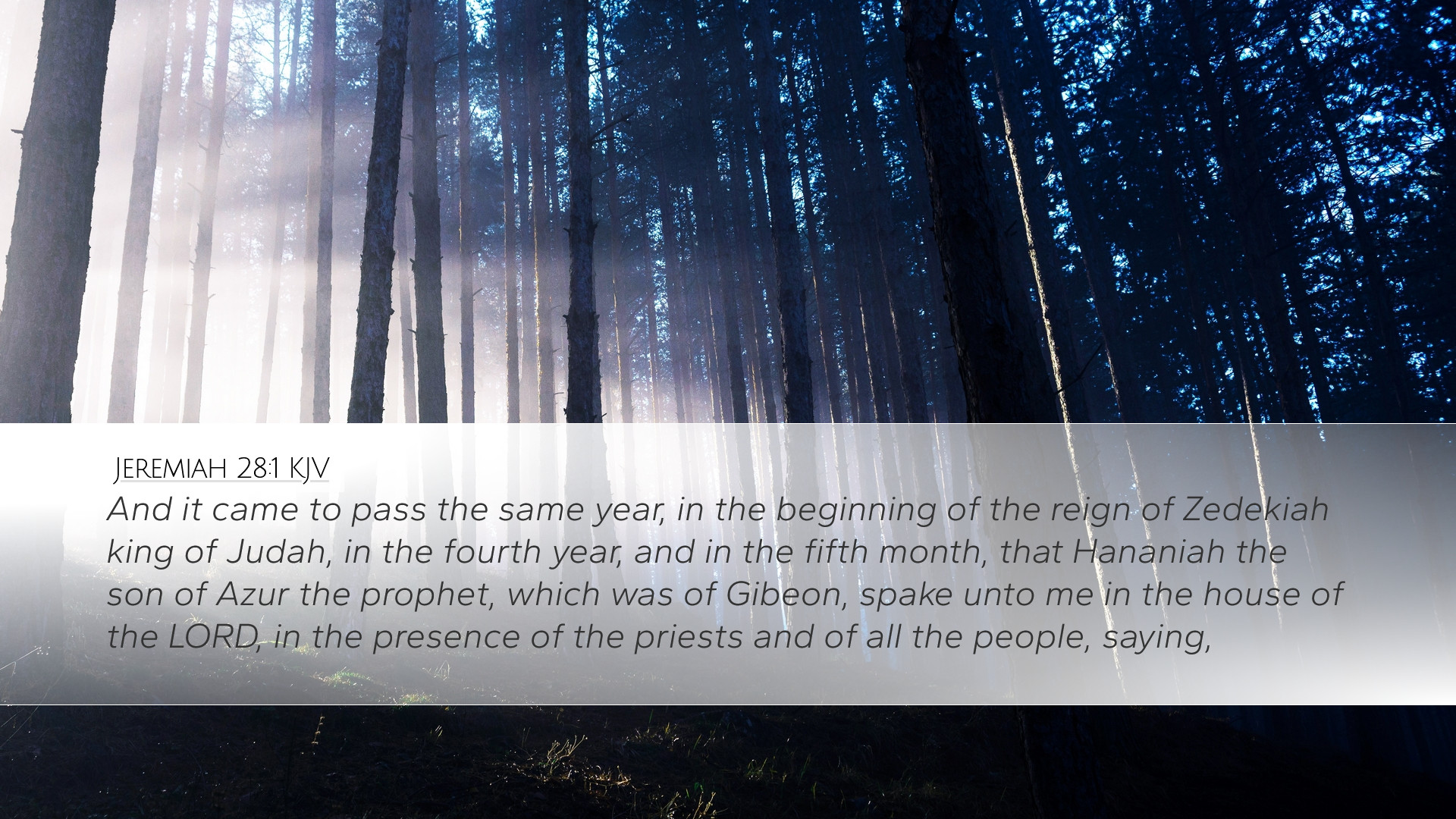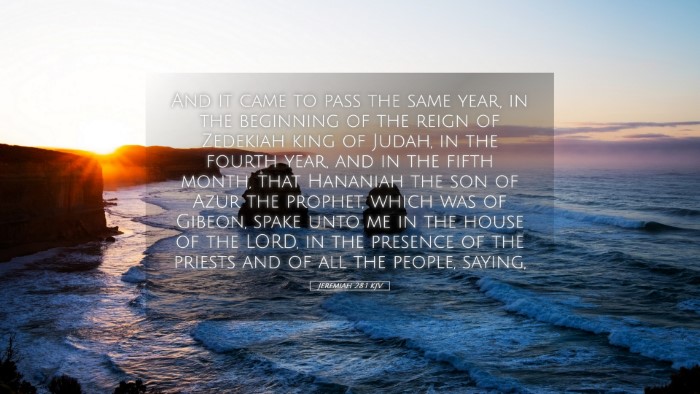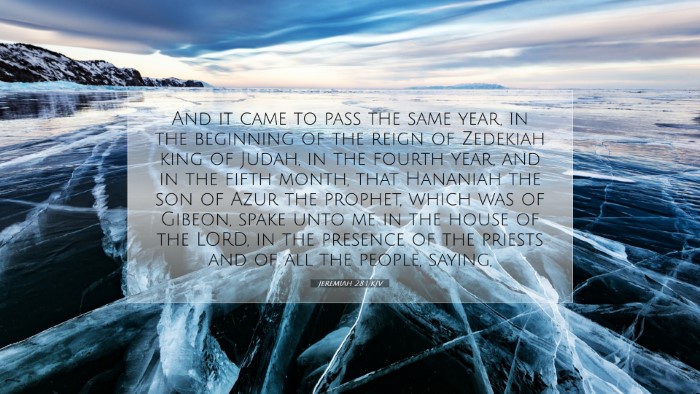Commentary on Jeremiah 28:1
Verse Reference: Jeremiah 28:1: "And it came to pass the same year, in the beginning of the reign of Zedekiah king of Judah, in the fourth year, and in the fifth month, that Hananiah the son of Azzur, the prophet, which was of Gibeon, spake unto me in the house of the LORD, in the presence of the priests and of all the people, saying."
Contextual Overview
This verse establishes the historical context for a pivotal event recorded in the Book of Jeremiah. The reference to Zedekiah's reign situates the narrative during a tumultuous time in Judah's history, characterized by impending judgment and national crisis. The interaction between Jeremiah and Hananiah reveals the tension between true and false prophecy that is central to the prophetic literature.
Historical Background
During the fourth year of Zedekiah's reign (circa 593 B.C.), Judah was under threat from Babylon. The people's faith in God was waning, and false prophets emerged, prophesying peace and security. This setting is crucial for understanding the ministry of Jeremiah, who contrasts sharply with these deceivers.
- Reign of Zedekiah: Zedekiah was the last king of Judah before the Babylonian conquest. His reign was marked by political intrigue and a struggle for autonomy from Babylonian influence.
- Role of Hananiah: Hananiah represents the false prophets who offered comforting illusions instead of the difficult truths declared by Jeremiah. He sought to provide hope through deceit.
- The House of the LORD: The mention of the temple setting highlights the weightiness of the prophetic words delivered; it underscores the spiritual authority and community significance of such declarations.
Commentary Insights
Below are insights drawn from respected public domain commentaries, providing a multi-faceted understanding of this verse.
Matthew Henry's Commentary
Matthew Henry highlights the importance of the timing of Hananiah's pronouncement. He notes that it is significant that the false prophet spoke amidst the people, juxtaposing the true prophetic voice of Jeremiah. Henry emphasizes that the people were inclined to listen to Hananiah due to their desire for comfort amidst looming disaster. His reflections reveal the pervasive issue of relying on comforting falsehoods rather than confronting painful truths.
Albert Barnes' Notes on the Bible
Albert Barnes focuses on the specific details of Hananiah’s identity and his origins. By mentioning Hananiah as the son of Azzur from Gibeon, Barnes shows that he was a prophet recognized among the Jews. This raises the question of how even respected individuals could espouse misleading messages. Barnes emphasizes the necessity for discernment among the faithful, stressing that not every claim of divine inspiration aligns with God’s actual word. Furthermore, he draws attention to the public nature of Hananiah's proclamation, arguing that the audience's presence indicates a collective vulnerability to falsehoods.
Adam Clarke's Commentary
Adam Clarke provides a theological reflection on the dynamics of prophecy as seen in this verse. He articulates that the interaction between Jeremiah and Hananiah illustrates the necessity of fidelity to God’s message, even in the face of popular opposition. Clarke posits that the false prophet's message aimed to pacify the people’s fears, a common temptation for prophets who sought to conform to societal desires rather than adhere to divine instruction. He urges contemporary readers to remain vigilant against similar temptations, advocating an unwavering commitment to truth regardless of popular sentiment.
Theological Implications
The exchange illustrated in Jeremiah 28:1 encompasses several critical theological themes:
- False Prophecy: The occurrence of false prophecy is a recurrent theme in the Old Testament. This verse serves as a powerful reminder that not all voices claiming to speak for God are authentic. It emphasizes the need for discernment among believers.
- Divine Sovereignty: The context of impending judgment highlights God's sovereignty over nations and the destiny of His people. Even amid chaos, God’s plan is unfolding, which should inspire hope among the faithful.
- Community and Worship: The setting in the temple underscores the communal aspect of faith. Prophecy, as seen in this exchange, affects the entire community. Therefore, what is declared in the name of God needs to be scrutinized for the church’s health.
Application for Today’s Believers
This verse, while situated in a particular historical context, possesses enduring relevance for modern-day believers, pastors, and theologians:
- Discernment: Individuals are called to develop spiritual discernment. Just as Jeremiah contended with the false assurances of Hananiah, Christians today must critically evaluate teachings within their communities.
- Faithfulness: This chapter encourages believers to remain faithful to God’s truth, even when it counters popular opinion. Pastoral leaders should model integrity by prioritizing divine revelation over cultural pressures.
- Embracing Truth: The discomfort of prophetic truth can be challenging; however, embracing it leads to genuine transformation and hope for redemption in Christ.
Conclusion
Jeremiah 28:1 is a critical reminder of the ongoing battle between truth and deception within the sphere of prophecy. By understanding the context and applying the lessons contained within this verse, believers can strengthen their commitment to God’s word and grow in discerning faith amidst the cacophony of voices in today’s world. As we navigate our spiritual journeys, may we carry forward the lessons from the lives of prophets like Jeremiah, standing firm in the truth of God’s promises.


